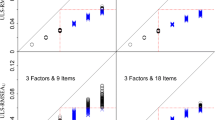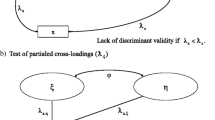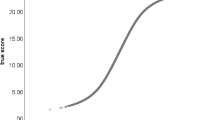Abstract
Objective: To investigate heterogeneity (systematic and observable variation) in health or health-related quality-of-life reports across population groups, for a given level of ‘true health’.
Design: The investigators undertook full sit-down face-to-face interviews with 1999 individuals representing Jewish Israelis aged 45 to 75 years who resided in urban Israeli communities in 1993. Three popular measures of health and health-related quality of life were used: a categorical subjective evaluation, the 36-item Short Form health survey and a visual analogue health-related quality-of-life rating scale. The empirical analysis of the various relationships was based on the use of multiple-indicator linear structural equation models with latent variables. The model was estimated by the 2-stage least squares (2SLS) method.
Results: In general, the results confirm the existence of substantial measure-specific heterogeneity in reporting (with differences associated with age, gender and education level) for all three measures.
Conclusions: The existence of heterogeneity in reporting renders the results of quality-of-life investigations sensitive to the sample used, and considerably limits the ability to generalise from these results and make comparisons with other populations. Economic evaluations based on self-reports are thus sensitive not only to the measure used, but also to the sample used. The application of results to populations differing in their socioeconomic and demographic structures, even if similar in the distribution of ‘true health’, might be misleading.



Similar content being viewed by others
References
Heyink J. Adaptation and well-being. Psychol Rep 1993; 73: 1331–42
Humphries K, van Doorslaer E. Income-related health inequality in Canada. Soc Sci Med 2000; 50: 663–671
Verbrugge LM. Gender and health: update on hypotheses and evidence. J Health Soc Behav 1985; 26: 156–82
Jylha M, Guralnik JM, Ferrucci L, et al. Is self-rated health comparable across cultures and genders? J Gerontol Soc Sci 1998; 53B: S144–52
Groot W. Adaptation and scale reference bias in self-assessments of quality of life. J Health Econ 2000; 19: 403–20
Kerkhofs M, Lindbroom M. Subjective health measures and state dependent reporting errors. Health Econ 1995; 4: 221–35
Wagstaff A, van Doorslaer E. Measuring inequalities in health in the presence of multiple-category morbidity indicators. Health Econ 1994; 3: 281–91
van Doorslaer E, Wagstaff A, Bleichrodt H, et al. Income-related inequalities in health: some international comparisons. J Health Econ 1997; 16: 93–112
Lewin-Epstein N, Sagiv-Shifter T, Shabtai E, et al. Validation of the SF-36-itemshort-form health survey (Hebrew version) in the adult population of Israel. Med Care 1998; 36: 1361–70
Ware JE, Sherbourne CD. The MOS 36-item short form health survey (SF-36): I. conceptual framework and item selection. Med Care 1992; 30: 473–96
Goldberger A S. Unobservable variables in econometrics. In: Frontiers in econometrics. Zarembka P, editor. New York (NY): Academic Press, 1974
Shmueli A. The SF-36 scales and health-related quality of life: an interpretive analysis. Qual Life Res 1998; 7: 187–96
Shmueli A. Subjective health status and health value in the general population. Med Decis Making 1999; 19: 122–7
Acknowledgements
Two referees provided very useful comments on an earlier draft of the paper. The author has no conflicts of interest relevant to this paper and there were no sources of funding.
Author information
Authors and Affiliations
Corresponding author
Rights and permissions
About this article
Cite this article
Shmueli, A. Reporting Heterogeneity in the Measurement of Health and Health-Related Quality of Life. Pharmacoeconomics 20, 405–412 (2002). https://doi.org/10.2165/00019053-200220060-00005
Published:
Issue Date:
DOI: https://doi.org/10.2165/00019053-200220060-00005




